新概念英语第一册第95-96课重点语法
- 格式:docx
- 大小:37.81 KB
- 文档页数:3
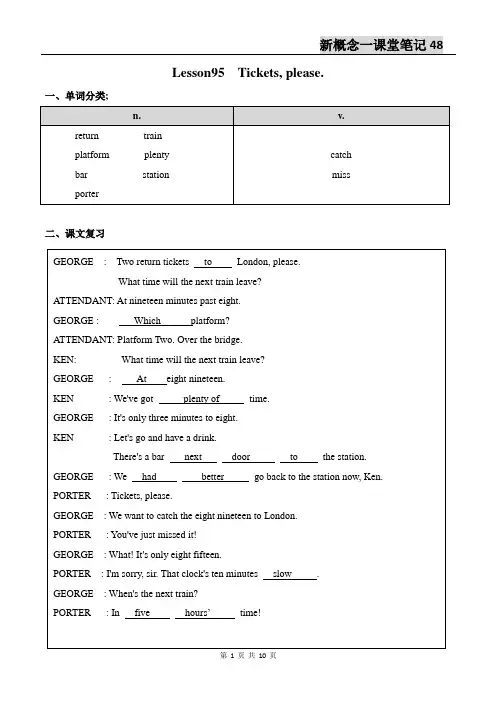
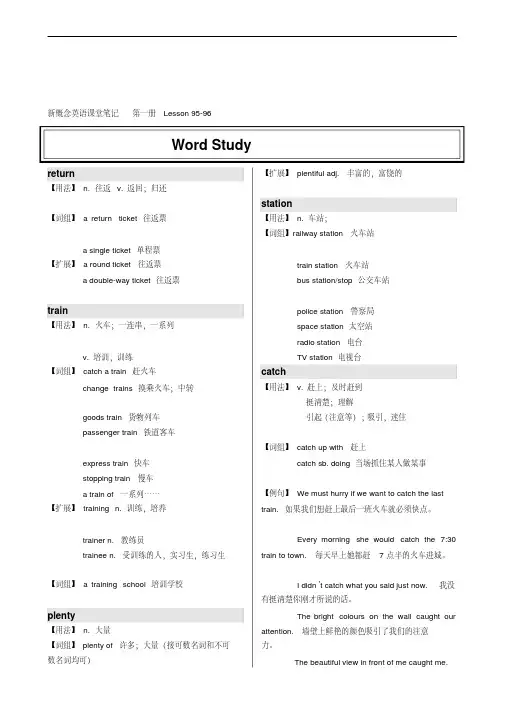
新概念英语课堂笔记第一册Lesson 95-96Word Studyreturn【用法】n. 往返v. 返回;归还【词组】a return ticket 往返票a single ticket 单程票【扩展】a round ticket 往返票a double-way ticket往返票train【用法】n. 火车;一连串,一系列v. 培训,训练【词组】catch a train 赶火车change trains 换乘火车;中转goods train 货物列车passenger train 铁道客车express train 快车stopping train 慢车a train of 一系列……【扩展】training n. 训练,培养trainer n. 教练员trainee n. 受训练的人,实习生,练习生【词组】a training school 培训学校plenty【用法】n. 大量【词组】plenty of 许多;大量(接可数名词和不可数名词均可)【扩展】plentiful adj. 丰富的,富饶的station【用法】n. 车站;【词组】railway station 火车站train station 火车站bus station/stop公交车站police station 警察局space station 太空站radio station 电台TV station 电视台catch【用法】v. 赶上;及时赶到挺清楚;理解引起(注意等);吸引,迷住【词组】catch up with 赶上catch sb. doing 当场抓住某人做某事【例句】We must hurry if we want to catch the last train. 如果我们想赶上最后一班火车就必须快点。
Every morning she would catch the 7:30 train to town. 每天早上她都赶7点半的火车进城。
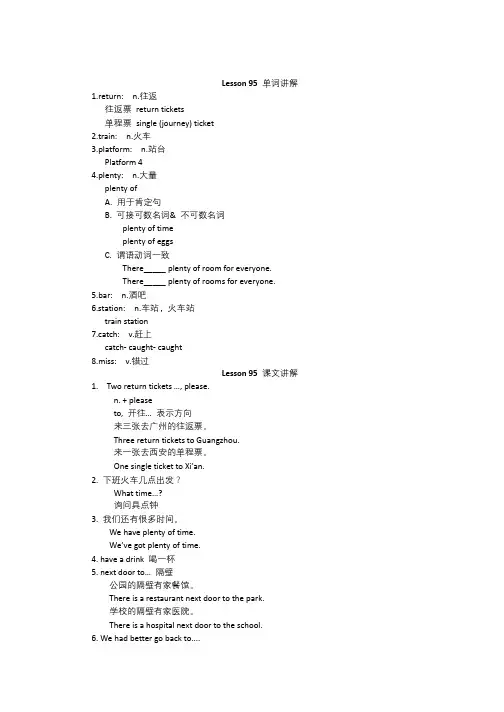
Lesson 95 单词讲解1.return: n.往返往返票return tickets单程票single (journey) ticket2.train: n.火车3.platform: n.站台Platform 44.plenty: n.大量plenty ofA. 用于肯定句B. 可接可数名词& 不可数名词plenty of timeplenty of eggsC. 谓语动词一致There_____ plenty of room for everyone.There_____ plenty of rooms for everyone.5.bar: n.酒吧6.station: n.车站,火车站train station7.catch: v.赶上catch- caught- caught8.miss: v.错过Lesson 95 课文讲解1. Two return tickets …, please.n. + pleaseto, 开往…表示方向来三张去广州的往返票。
Three return tickets to Guangzhou.来一张去西安的单程票。
One single ticket to Xi’an.2. 下班火车几点出发?What time…?询问具点钟3. 我们还有很多时间。
We have plenty of time.We’ve got plenty of time.4. have a drink 喝一杯5. next door to…隔壁公园的隔壁有家餐馆。
There is a restaurant next door to the park.学校的隔壁有家医院。
There is a hospital next door to the school.6. We had better go back to....had better: 最好7. We want to catch the eight nineteen…the eight nineteen- the train leaves at 8:198. 那钟慢了10 分钟。
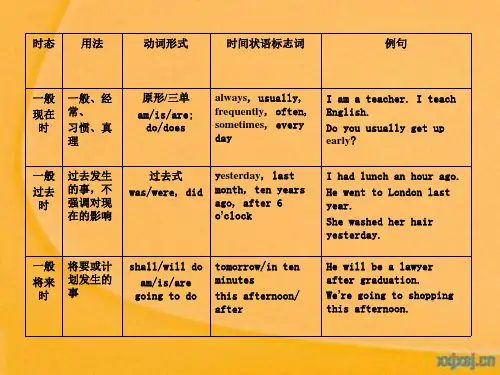
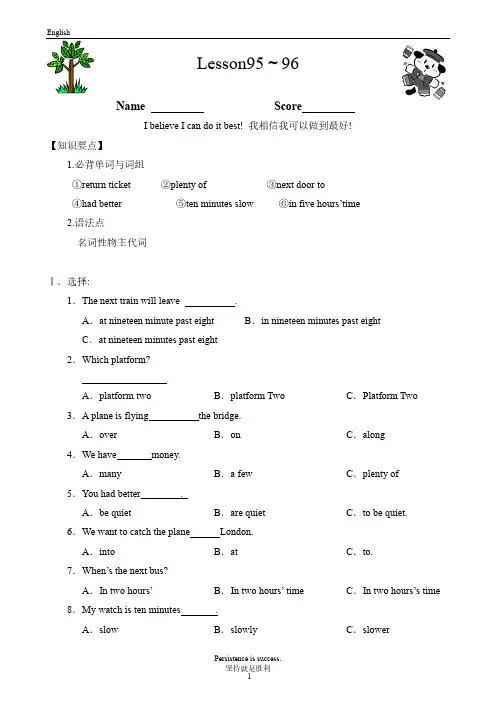
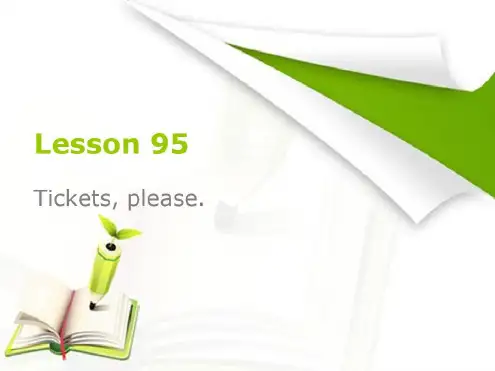
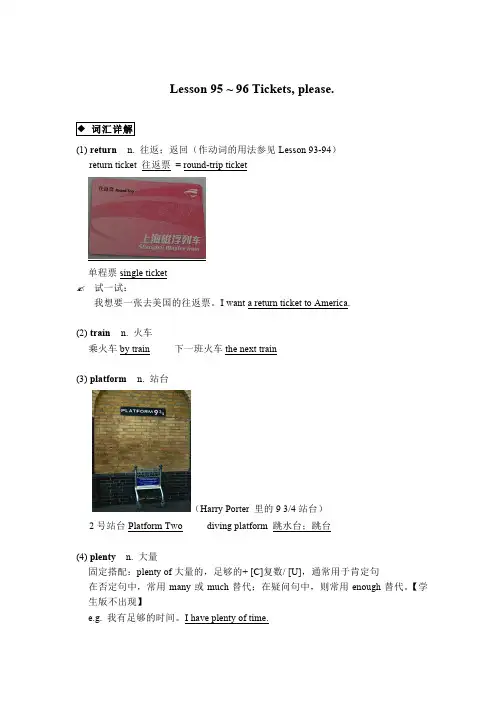
Lesson 95 ~ 96 Tickets, please.◆ 词汇详解(1) return n. 往返;返回(作动词的用法参见Lesson 93-94)return ticket 往返票= round-trip ticket单程票single ticket!试一试:我想要一张去美国的往返票。
I want a return ticket to America.(2) train n. 火车乘火车by train 下一班火车the next train(3) platform n. 站台(Harry Porter 里的9 3/4站台)2号站台Platform Two diving platform 跳水台;跳台(4) plenty n. 大量固定搭配:plenty of大量的,足够的+ [C]复数/ [U],通常用于肯定句在否定句中,常用many或much替代;在疑问句中,则常用enough替代。
【学生版不出现】e.g. 我有足够的时间。
I have plenty of time.(5) bar n. 酒吧【学生版不出现】文化背景:访问英国的人会发现传统英国酒吧是最能领略当地文化的地方。
但对于初来乍到的异国人来说,这些友善的酒吧却犹如潜藏着有惹事危险的"地雷区"。
一位人类学家和一组研究人员揭示了某些鲜为人知的英国酒吧文化。
人们首先遇到的困难是从买酒开始的。
大多数英国酒吧都没有酒保,你得到吧台去买酒。
这听上去似乎让人觉得不方便,可却有它深刻的内涵。
在因其冷漠而出名的英国社会里,酒吧文化的形成是为了促进社会交往。
排队的时候可以和其他等待买酒的人交谈。
在英伦诸岛上,和陌生人亲切地交谈被认为是完全适宜的正常行为的唯一场所可能就是吧台了。
“你如果没去过酒吧,那就等于没有到过英国。
"这对那些想要领略"英国生活和文化核心部分"的人是一种行为准则。
酒吧主要有以下几种形式:主酒吧(main bar),服务酒吧(service bar),宴会酒吧(banquet bar),绅士酒吧(gentleman bar),会员制酒吧(club bar),鸡尾酒廊(cocktail lounge),酒馆(tavern)。
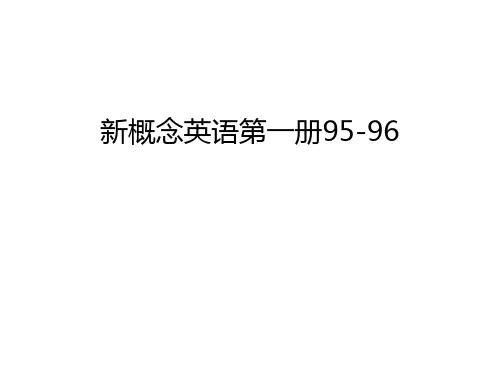
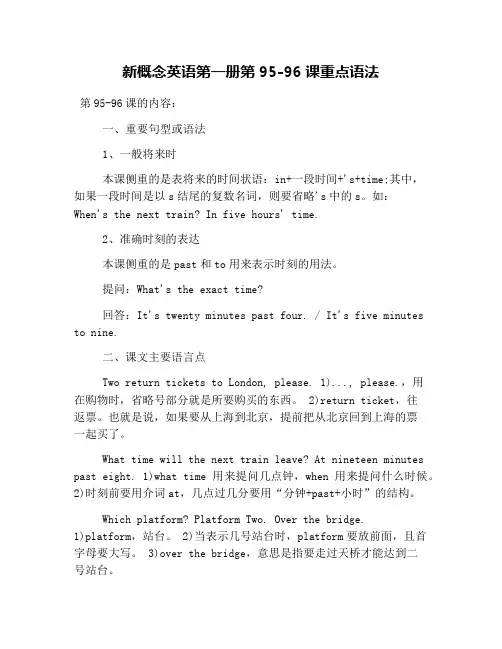
新概念英语第一册第95-96课重点语法第95-96课的内容:一、重要句型或语法1、一般将来时本课侧重的是表将来的时间状语:in+一段时间+'s+time;其中,如果一段时间是以s结尾的复数名词,则要省略's中的s。
如:When's the next train? In five hours' time.2、准确时刻的表达本课侧重的是past和to用来表示时刻的用法。
提问:What's the exact time?回答:It's twenty minutes past four. / It's five minutes to nine.二、课文主要语言点Two return tickets to London, please. 1)..., please.,用在购物时,省略号部分就是所要购买的东西。
2)return ticket,往返票。
也就是说,如果要从上海到北京,提前把从北京回到上海的票一起买了。
What time will the next train leave? At nineteen minutes past eight. 1)what time用来提问几点钟,when用来提问什么时候。
2)时刻前要用介词at,几点过几分要用“分钟+past+小时”的结构。
Which platform? Platform Two. Over the bridge.1)platform,站台。
2)当表示几号站台时,platform要放前面,且首字母要大写。
3)over the bridge,意思是指要走过天桥才能达到二号站台。
What time will the next train leave? At eight nineteen.几点几分也能够直接表达为:小时+分钟。
We've got plenty of time. 1)have got,相当于have,表示“有”。
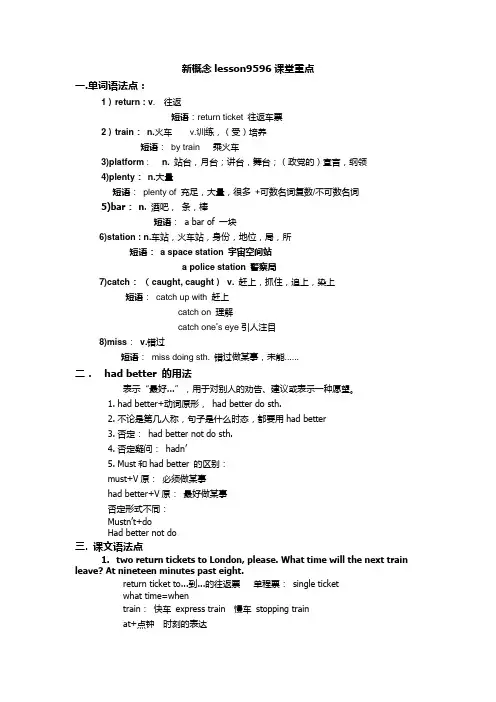
新概念lesson9596课堂重点一.单词语法点:1)return : v. 往返短语:return ticket 往返车票2)train:n.火车v.训练,(受)培养短语:by train 乘火车3)platform : n.站台,月台;讲台,舞台;(政党的)宣言,纲领4)plenty:n.大量短语:plenty of 充足,大量,很多+可数名词复数/不可数名词5)bar:n. 酒吧,条,棒短语:a bar of 一块6)station : n.车站,火车站,身份,地位,局,所短语:a space station 宇宙空间站a police station 警察局7)catch:(caught, caught)v. 赶上,抓住,追上,染上短语:catch up with 赶上catch on 理解catch one’s eye引人注目8)miss:v.错过短语:miss doing sth. 错过做某事,未能......二.had better 的用法表示“最好...”,用于对别人的劝告、建议或表示一种愿望。
1.had better+动词原形,had better do sth.2.不论是第几人称,句子是什么时态,都要用had better3.否定:had better not do sth.4.否定疑问:hadn’5.Must和had better 的区别:must+V原:必须做某事had better+V原:最好做某事否定形式不同:Mustn’t+doHad better not do三. 课文语法点1.two return tickets to London, please. What time will the next train leave? At nineteen minutes past eight.return ticket to...到...的往返票单程票:single ticketwhat time=whentrain:快车express train 慢车stopping trainat+点钟时刻的表达2.Which platform? Platform Two. Over the bridge.which引导的特殊疑问句over 介词,跨越,横跨(从一边到另一边)3.We’ve got plenty of time.have gotplenty of+可数名词/不可数名词(肯定句)4.It’s only three minutes to eight. Let’s go and have a drink. There’s a bar next door to the station.Let sb. do sth. 祈使句and连接两个动作there be句型next door to5.We had better go back to the station now, Ken.had better do sth.(见语法讲解)go back to6.We want to catch the eight nineteen to London.want的用法catch the eight nineteen借代手法,是指赶上8:19的火车7.You’ve just missed it!现在完成时8.In five hours’ time!in 在......后名词所有格In five hours’ time= in five hours四.时间的表达方式:1)直接读6:40 six forty o’clock2)≦30分钟分钟数+past+点钟数6:20 twenty past six o’clock3)>30 分钟60分钟数+to+下一个点钟6:40 twenty to seven o’clock。
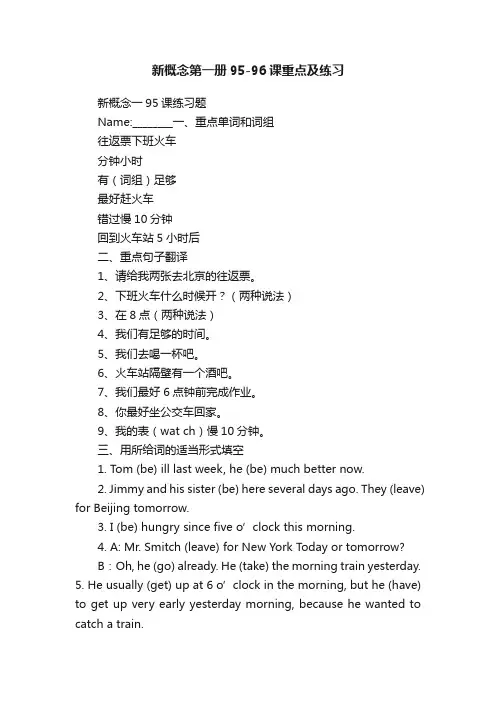
新概念第一册95-96课重点及练习新概念一95课练习题Name:________一、重点单词和词组往返票下班火车分钟小时有(词组)足够最好赶火车错过慢10分钟回到火车站5小时后二、重点句子翻译1、请给我两张去北京的往返票。
2、下班火车什么时候开?(两种说法)3、在8点(两种说法)4、我们有足够的时间。
5、我们去喝一杯吧。
6、火车站隔壁有一个酒吧。
7、我们最好6点钟前完成作业。
8、你最好坐公交车回家。
9、我的表(wat ch)慢10分钟。
三、用所给词的适当形式填空1. Tom (be) ill last week, he (be) much better now.2. Jimmy and his sister (be) here several days ago. They (leave) for Beijing tomorrow.3. I (be) hungry since five o’clock this morning.4. A: Mr. Smitch (leave) for New York Today or tomorrow?B:Oh, he (go) already. He (take) the morning train yesterday.5. He usually (get) up at 6 o’clock in the morning, but he (have) to get up very early yesterday morning, because he wanted to catch a train.6. He (be) never to China, but she was there in 1992.四、选择填空1. He has been in Shanghai last month.A. forB. sinceC. afterD. before2. will you get to Rome? By plane.A. whenB. whereC. HowD. What3. She has _____________ money to buy the book.A. anyB. plentyC.plenty ofD. lot4. You bring this umbrella, it’s raining outside.A. haveB. had betterC. didD. had五、句式转换1. I’ve already aired the room. (改为一般疑问句并作肯定、否定回答)2. He met her two weeks ago. (就划线部分提问)3. He bought a house last year. (改为一般疑问句并作否定回答)4. It rained yesterday. (改为一般将来时)5. He will fly to Swiss next month. (就划线部分提问)6. Will you go to Athens next week? (作肯定、否定回答)7. We must go back to the station. (用had better 改写此句)8. Tom flew to Shanghai two weeks ago. (改为一般疑问句并作否定回答)。
新概念英语第一册习惯用语大全:Lesson 95-96
Lesson 95~ 96
what pron.什么;表示惊讶、惊恐、多么;(相当于或)…的事情;一切;为什么;如果… adj. 什么样的 int.表示惊奇、惊恐等;什么;
so what又有什么关系;有什么用呢(what does that matter; what difference does that make)
A:Have you heard the news that we won't be laid off?
A:你听到我们不会被解雇的消息了吗?
B:So what? I'm tired of working here.
B:这又有什么关系呢,我已经厌倦了在这里工作。
例句:Maybe his father is very rich. But, so what? He
wouldn't accept any help from his father, even if it were offered.
也许他父亲很有钱。
不过,又怎么样呢?就算是他父亲愿意提供协助,他也不会接受的。
come what may 无论发生什么,不管怎样
例句:We'll pick you up tomorrow at eight, come what may.
不管怎样,明天早上8点我们去接你。
新概念英语第1册语法及单词Lesson91~96新概念英语第1册语法及单词Lesson91~92语法 Grammar in use一般将来时(1)一般将来时表示将来某一时刻的动作、状态以及准备。
该时态一般与表示将来意义的时间状语连用,如tomorrow(明天),this month(本月), the day after tomorrow(后天),next week (下周), in two days”time(两天之后), from now on(从现在起),in the future(将来)等。
(2)一般将来时的形式为 will/shall+ 动词原形。
will可用于全部人称,但shall仅表示单纯将来时用于第一人称I 和we,作为will的一种替代形式。
否认缩写: shan”t =shall not, won”t =will not:I shan”t leave tonight. I”ll leave tomorrow.今日夜里我不走。
我将于明天离开。
They won”t go to London this weekend.这个周末他们不去伦敦。
此外,will除了表示纯粹的将来时间外,还表示说话人的意图和意愿,而shall除了表示将来时间外同时还表示说话人的责任或决心。
(3)除了will/shall外,还可以用其他方法表示将来。
在口语中,be going to比 will/shall更为一般,用来表示说话人的意图或准备。
如: She is going to travel by air.她准备乘飞机旅行。
也可用来表示有迹象某事马上发生。
如:It”s going to rain.将要下雨了。
(4)可与将来时连用的时间短语有:今日:this morning / afternoon / evening今日上午/下午/晚上明天:tomorrow morning / afternoon / evening明天上午/下午/晚上后天:the day after tomorrow后天the night after next后天夜里其他:tonight今夜in the morning在上午in the afternoon 在下午in the evening在晚上词汇学习 Word study1.miss v.(1)惦念,惦念:We”ll miss you.我们会惦念你的。
Lesson 95-96Tickets, please.GEORGE: Two return tickets to London, please.What time will the next train leave? ATTENDANT: At nineteen minutes past eight.GEORGE: Which platform?ATTENDANT: Platform Two. Over the bridge.KEN: What time will the next train leave?GEORGE: At eight nineteen.KEN: We've got plenty of time.GEORGE: It's only three minutes to eight.KEN: Let's go and have a drink.There's a bar next door to the station.GEORGE: We had better go back to the station now, Ken. PORTER: Tickets, please.GEORGE: We want to catch the eight nineteen to London. PORTER: You've just missed it!GEORGE: What! It's only eight fifteen.PORTER: I'm sorry, sir. That clock's ten minutes slow. GEORGE: When's the next train?PORTER: In five hours' time!1. Two return tickets to London, please.return1) n. 往返return ticket 往返票2) in return 作为回报--You sent me a postcard; in return, I sent you a postcard too.--The employees have worked so hard. Their boss is going to give them a raise in return.3)v. 回到return from…to…从…回到…return sth to sb = return sb sth 把…归还某人2. What time will the next train leave?注意What time询问是具体时间的,而When询问的是大概时间。
Lesson 95-96Tickets, please.GEORGE: Two return tickets to London, please.What time will the next train leave? ATTENDANT: At nineteen minutes past eight.GEORGE: Which platform?ATTENDANT: Platform Two. Over the bridge.KEN: What time will the next train leave?GEORGE: At eight nineteen.KEN: We've got plenty of time.GEORGE: It's only three minutes to eight.KEN: Let's go and have a drink.There's a bar next door to the station.GEORGE: We had better go back to the station now, Ken. PORTER: Tickets, please.GEORGE: We want to catch the eight nineteen to London. PORTER: You've just missed it!GEORGE: What! It's only eight fifteen.PORTER: I'm sorry, sir. That clock's ten minutes slow. GEORGE: When's the next train?PORTER: In five hours' time!1. Two return tickets to London, please.return1) n. 往返return ticket 往返票2) in return 作为回报--You sent me a postcard; in return, I sent you a postcard too.--The employees have worked so hard. Their boss is going to give them a raise in return.3)v. 回到return from…to…从…回到…return sth to sb = return sb sth 把…归还某人2. What time will the next train leave?注意What time询问是具体时间的,而When询问的是大概时间。
新概念英语第一册:95-96课语法及单词解析【篇一】语法 Grammar in usehad better与 musthad better表示“还是”、“”,表达某种忠告或建议。
must则表示“必须”、“一定”,语气比 had better强烈。
had better表示现在时或将来时,而不是过去时。
其否定形式为had better not请比较下列句子:We must go back to the station.我们必须回车站去。
We had better go back to the station.我们回车站去。
She must hurry.她得抓紧点儿。
She had better hurry.她抓紧点儿。
【篇二】词汇学习 Word studyexact adj.(1)精确的;确切的;恰好的:What is the exact time?确切时间是什么时候?This vase is an exact replica.这只花瓶是件很巧妙的复制品。
Its the exact shape Ive been looking for.这恰好是我一直以来要寻找的形状。
(2)严格的;严厉的:The workers must obey exact rules.工人们必须遵守严格的规定。
【篇三】catch v.(1)赶上;即时赶到:We must hurry if we want to catch the last train.如果我们想赶上最后一班火车就必须快点。
Every morning she would catch the 7.30 train to town.每天早上她都赶7点半的那班火车进城。
(2)听清楚;理解:I didnt catch what you said just now.我没听清楚你刚才所说的话。
(3)引起(注意等);吸引,迷住:The bright colours on the wall caught our attention.。
新概念英语第一册第95-96课重点语法
第95-96课的内容:
一、重要句型或语法
1、一般将来时
本课侧重的是表将来的时间状语:in+一段时间+'s+time;其中,
如果一段时间是以s结尾的复数名词,则要省略's中的s。
如:
When's the next train? In five hours' time.
2、准确时刻的表达
本课侧重的是past和to用来表示时刻的用法。
提问:What's the exact time?
回答:It's twenty minutes past four. / It's five minutes to nine.
二、课文主要语言点
Two return tickets to London, please. 1)..., please.,用
在购物时,省略号部分就是所要购买的东西。
2)return ticket,往
返票。
也就是说,如果要从上海到北京,提前把从北京回到上海的票
一起买了。
What time will the next train leave? At nineteen minutes past eight. 1)what time用来提问几点钟,when用来提问什么时候。
2)时刻前要用介词at,几点过几分要用“分钟+past+小时”的结构。
Which platform? Platform Two. Over the bridge.
1)platform,站台。
2)当表示几号站台时,platform要放前面,且首字母要大写。
3)over the bridge,意思是指要走过天桥才能达到二
号站台。
What time will the next train leave? At eight nineteen.
几点几分也能够直接表达为:小时+分钟。
We've got plenty of time. 1)have got,相当于have,表示“有”。
2)plenty of,很多,一般后接不可数名词。
It's only three minutes to eight. 几点差几分的表达为:所
差分钟+to+小时。
Let's go and have a drink. 1)Let's do sth.,表示“让我们
干什么事情”。
注意Let's后面要用动词原形。
2)have a drink,喝
点东西。
There's a bar next door to the station. next door to,靠近、邻门。
We had better go back to the station now, Ken. 1)had better,属于情态动词范畴,后面要紧跟动词原形;否定形式直接在better后面加not;口语中had经常省略。
2)go back to,回到。
We want to catch the eight nineteen to London 1)catch,
赶上。
2)句中的the eight nineteen用来代指表示八点十九分的火车。
You've just missed it! miss,错过。
What! It's only eight fifteen. What!,常用来表示惊讶或感叹。
I'm sorry, sir. That clock's ten minutes slow. 时间+slow,表示钟慢了多长时间。
When's the next train? In five hours' time! 注意将来时间
状语的表达:in+一段时间+'s+time。
三、双课补充内容
1、操练句型:When did he/Will he go to ...?
2、操练句型:What's the exact time? It's ....。